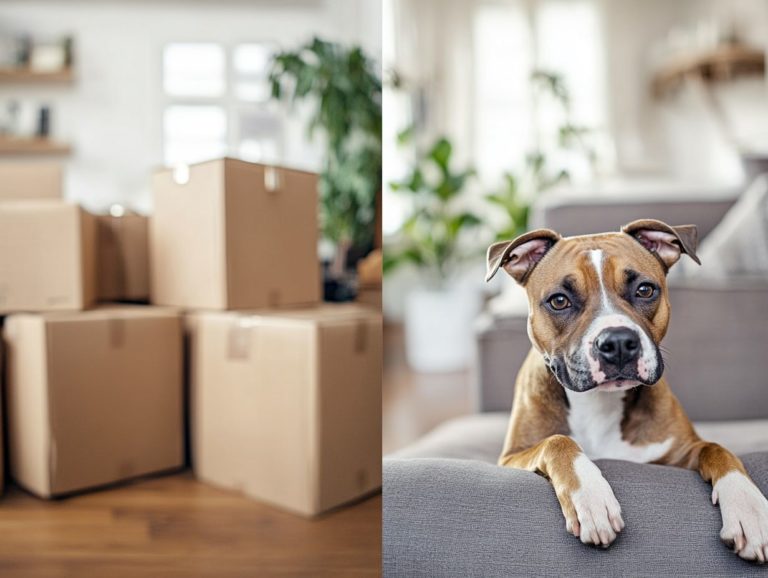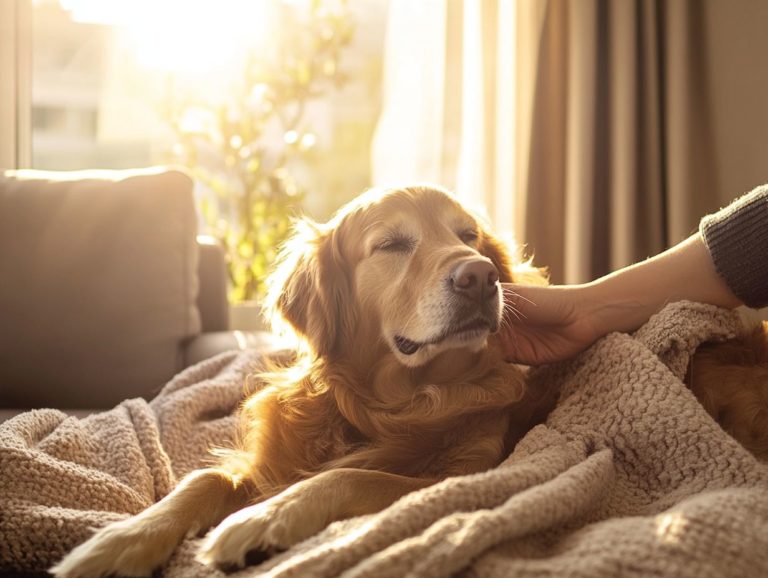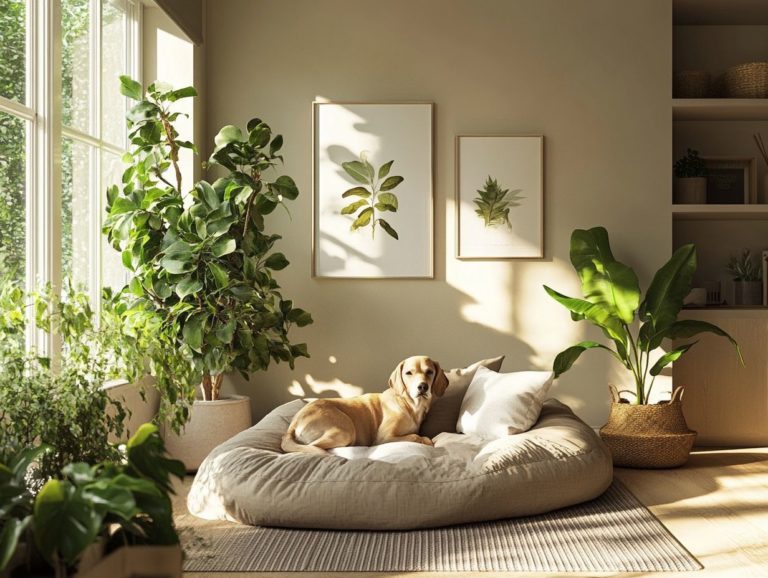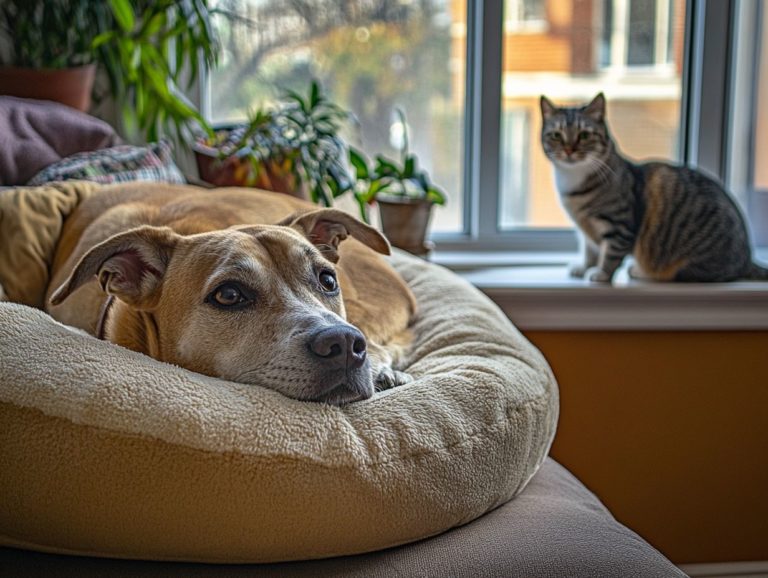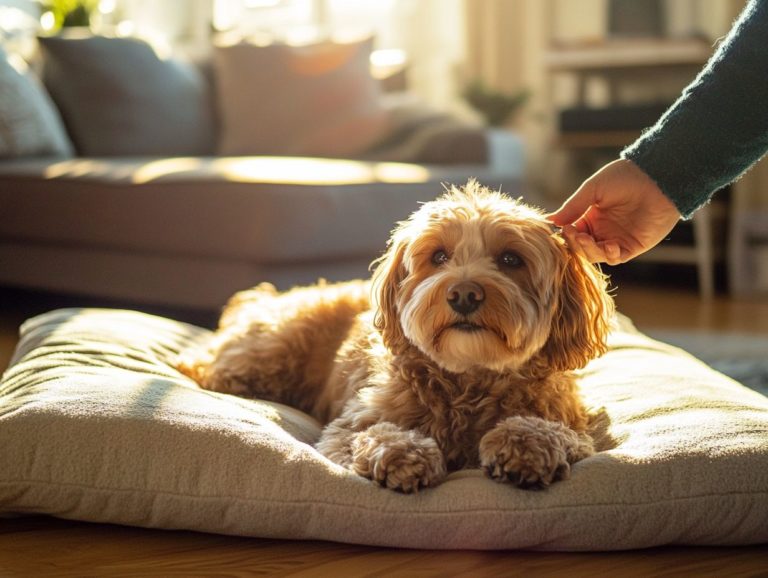The Benefits of Professional Training for Anxious Pets
Understanding and addressing pet anxiety is essential for ensuring the well-being of your furry companions.
This article delves into the significant effects that anxiety can have on both the health and behavior of pets, underscoring the importance of seeking professional training. You ll discover various training methods available and the profound benefits they can offer.
You will find tips to identify the root causes of your pet’s anxiety and create a nurturing environment.
Dive in now to learn how you can support your anxious pets, paving the way for a happier and healthier life together.
Contents
- Key Takeaways:
- The Importance of Addressing Pet Anxiety
- Professional Training for Anxious Pets
- Understanding the Root Causes of Pet Anxiety
- Creating a Supportive Environment for Anxious Pets
- Working with a Professional Trainer
- Frequently Asked Questions
- What are the benefits of professional training for anxious pets?
- How does professional training differ from at-home training for anxious pets?
- What specific techniques are used in professional training for anxious pets?
- Is professional training only for severe cases of anxiety in pets?
- What are some common signs of anxiety in pets that may benefit from professional training?
- Can professional training help with other behavioral issues besides anxiety?
Key Takeaways:
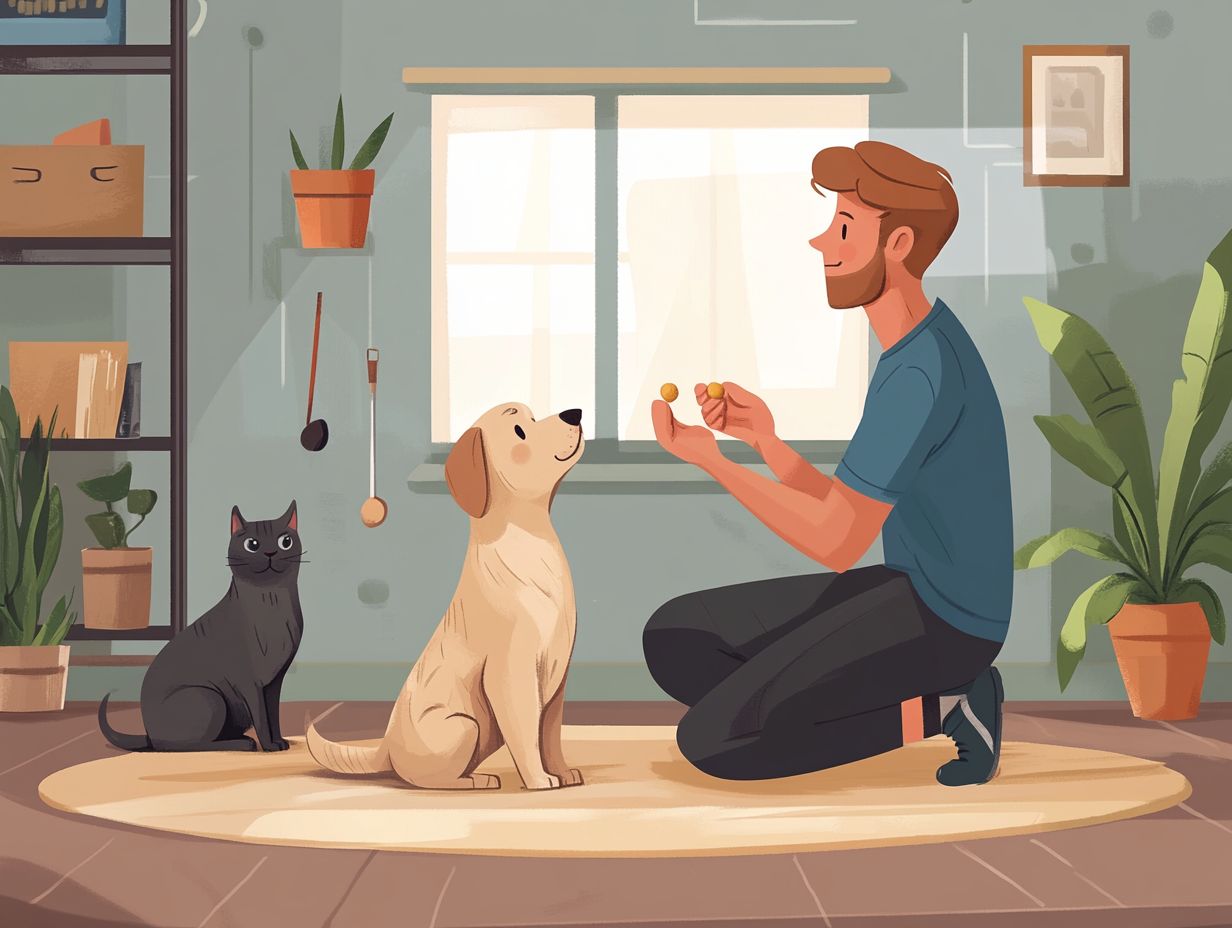
- Professional training greatly benefits anxious pets, improving their overall health and behavior.
- Understanding the root causes helps trainers create a customized plan for your pet.
- A supportive environment reduces stress and promotes relaxation.
The Importance of Addressing Pet Anxiety
Addressing pet anxiety is essential for the overall well-being of your dogs and puppies, particularly in the aftermath of the pandemic. Many pets have developed anxiety due to lockdowns, environmental changes, and the presence of unfamiliar humans.
By understanding how anxiety impacts your pet s health and behavior, you can implement effective strategies to reduce their stress and cultivate positive emotions in your beloved companions.
Effects on Pet Health and Behavior
Pet anxiety can have significant repercussions on the health and behavior of your dog, impacting their overall mental well-being and ability to socialize with both people and other pets.
When your dog is anxious, you might notice behaviors like excessive barking, trembling, or even aggression towards perceived threats. These responses create a stressful atmosphere for your pet and can strain your relationships with them and other animals in your home.
If left unaddressed, chronic anxiety can lead to physical health problems, such as digestive issues or a weakened immune system, as noted by the Animal Humane Society. Insights from the University of Portsmouth highlight that without timely intervention, these behaviors can escalate, creating a cycle of stress that diminishes your dog s quality of life and disrupts the harmony of your household.
Professional Training for Anxious Pets
Professional training for anxious pets provides you with specific methods designed to significantly ease anxiety and enhance your dog’s social skills, including tips for training anxious pets at home.
Through structured obedience training and expert guidance, you can elevate their overall well-being and behavior, creating a more harmonious environment for both of you.
Types of Training Available
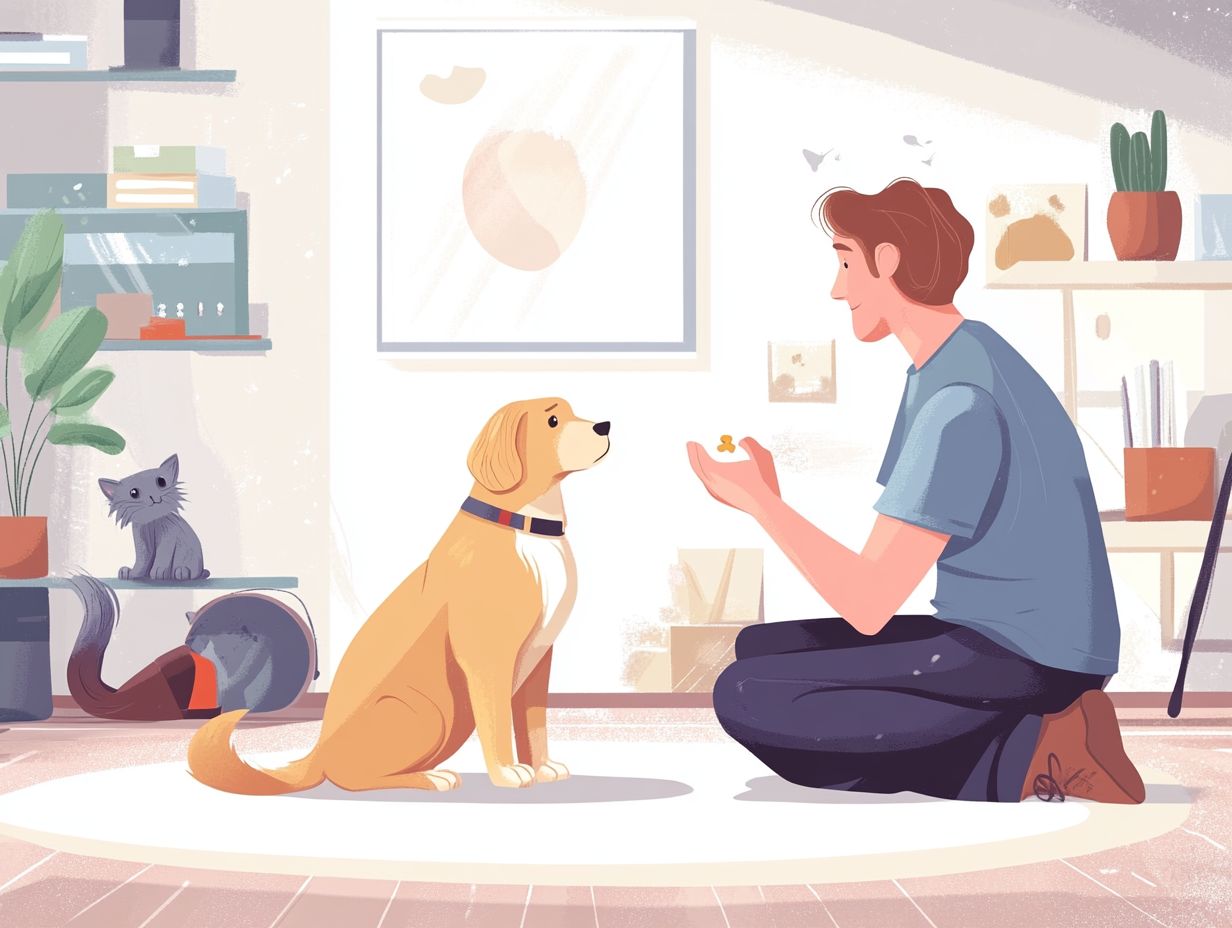
There are several types of professional training available for anxious dogs, including obedience training, group classes, and specialized techniques, such as understanding positive reinforcement for anxious pets, that cater to the unique needs of pets dealing with anxiety.
Among the diverse options, you ll find agility training, which not only builds confidence through physical challenges but also strengthens the bond between you and your dog. Scent work can engage your dog’s natural instincts, keeping them mentally stimulated and focused, which helps in reducing their anxiety.
Canine freestyle offers a playful twist, blending obedience with dance and allowing your dog to express themselves creatively. It s important to assess your dog’s specific anxiety triggers whether it s loud noises, unfamiliar environments, or social interactions to choose the most suitable training approach.
Tailoring the training to address these specific behaviors can lead to a more effective outcome, ultimately enhancing your dog’s well-being.
Benefits of Professional Training
The benefits of professional training for anxious pets go beyond mere behavioral fixes; they offer long-lasting advantages that enhance socialization skills and provide mental stimulation. Understanding the science behind training anxious pets fosters a deeper companionship between you and your dog.
As this bond strengthens, you ll find that your dog s anxiety diminishes. This enrichment will enhance your own mental well-being with the joy of having a well-behaved companion. Training sessions become meaningful moments of connection and trust-building, where both you and your pet learn to communicate effectively.
A well-trained dog often exudes confidence in community spaces, like dog parks, leading to safer and more enjoyable interactions with other pets and people.
This creates not only a positive atmosphere but also encourages responsible pet ownership, nurturing a greater sense of harmony within your community.
Understanding the Root Causes of Pet Anxiety
Grasping the root causes of pet anxiety is crucial for you as a dog owner in your pursuit of effective solutions. Various triggers, from unfamiliar humans to shifts in the environment, can significantly contribute to anxiety and shape your dog’s behavior.
Understanding these factors gives you the power to better support your furry friend and create a more harmonious home.
Identifying Triggers and Underlying Issues
Identifying the triggers and underlying issues that contribute to your pet’s anxiety requires a combination of careful observation and a deep understanding of your dog’s behavior in various situations. This insight allows you to address specific concerns effectively.
Tune in to your dog’s reactions during different scenarios be it loud noises, unfamiliar faces, or shifts in routine. You can start to pinpoint the exact sources of their anxiety.
Look out for common behavioral indicators like excessive barking, pacing, or attempts to hide; these signals often indicate distress. Recognizing these patterns is essential, as they offer valuable insight into how your dog processes its environment.
Once you’ve identified these triggers, you can implement targeted training strategies that foster a more supportive and calming atmosphere for your pet. Regularly monitoring these behaviors will also enable you to adapt your management techniques to meet your dog’s unique needs.
Creating a Supportive Environment for Anxious Pets
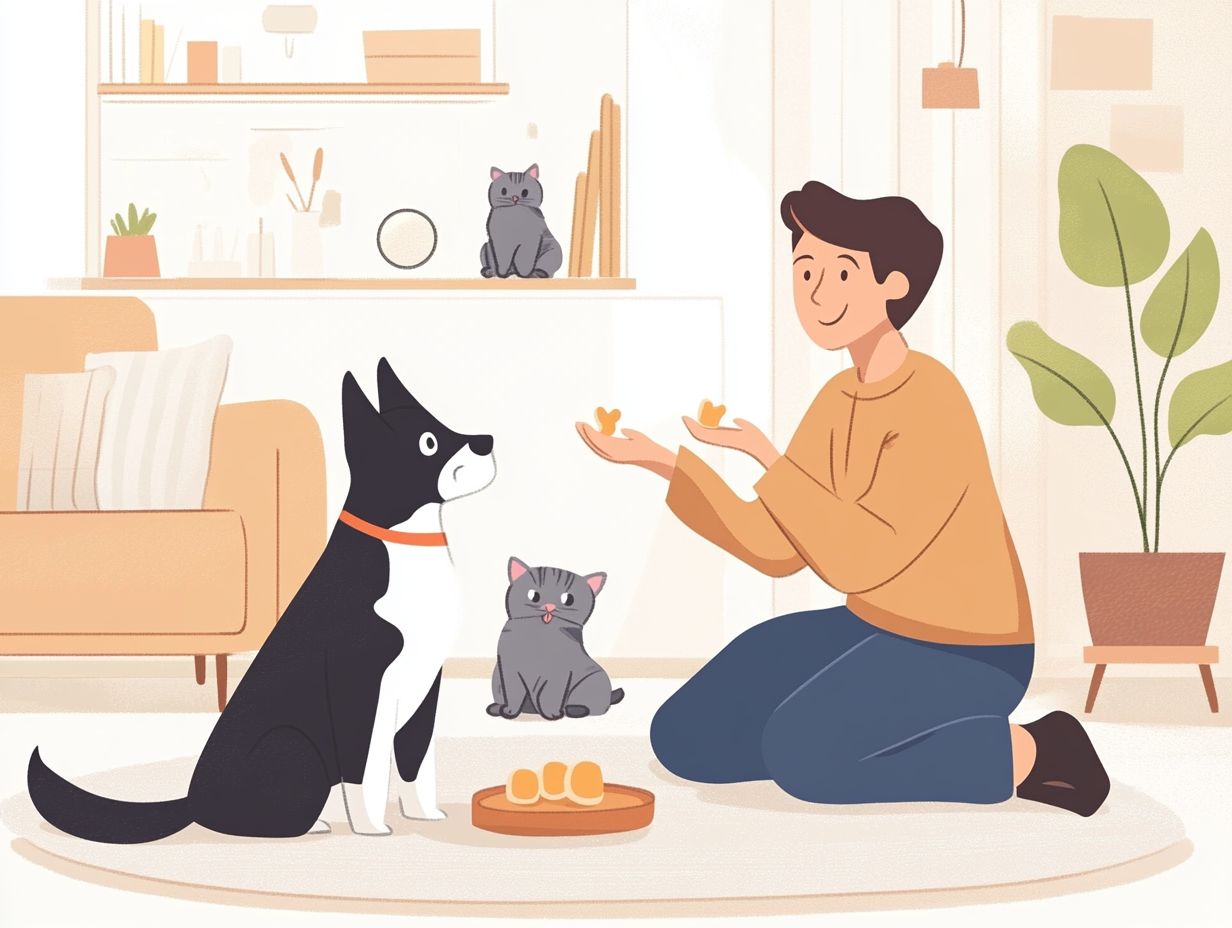
Creating a cozy and supportive space for your anxious pets can make a world of difference! By providing them with a secure space, you foster trust and emotional resilience, helping them navigate through challenging moments with greater ease.
Tips for Reducing Stress and Promoting Relaxation
To effectively reduce stress and promote relaxation in anxious pets, consider incorporating fun activities and relaxation techniques that suit your pet’s individual needs.
Introduce interactive toys designed to challenge their minds. This provides both entertainment and stimulation, effectively shifting their focus away from anxiety triggers.
Play calming music designed for pets to transform their environment into a soothing sanctuary. This helps to lower stress levels during particularly tense moments.
Integrating these elements into your daily routine be it during playtime or quiet periods creates a sense of predictability and security for your pet. This approach not only alleviates anxiety but also fosters a deeper bond between you and your furry companion, contributing to a more harmonious home life.
Working with a Professional Trainer
Collaborating with a professional trainer can truly transform the experience for both anxious pets and their owners. They provide essential skills and techniques, and understanding the benefits of pet anxiety workshops can enhance effective behavioral management and training.
This journey enhances the bond between you and your pet while giving you the knowledge needed to navigate challenges with confidence. Start today and create a calmer, happier environment for your furry friend!
What to Expect and How to Prepare
During training sessions with a professional trainer, you can anticipate a well-structured environment designed to address your pet’s fears while promoting effective communication. Understanding the importance of patience in training anxious pets is also key to achieving success.
These sessions typically kick off with a warm-up phase. The trainer sets a calm atmosphere, allowing your pet to feel safe and secure. Expect to see techniques like positive reinforcement, clicker training, and desensitization in action, all aimed at encouraging desirable behaviors and gradually diminishing anxiety triggers.
To ensure a productive training experience, it’s essential for you to make your pet feel comfortable and relaxed. Practice mindfulness techniques to maintain a composed demeanor, which will benefit both you and your furry companion.
Keeping training sessions short and engaging, while incorporating high-value treats, will further enrich the learning experience for everyone involved.
Frequently Asked Questions

What are the benefits of professional training for anxious pets?
Professional training will empower anxious pets to conquer their fears, highlighting the role of trust in training anxious pets, leading to happier and healthier lives.
How does professional training differ from at-home training for anxious pets?
Professional trainers possess specialized knowledge and experience in dealing with anxious pets, offering personalized training plans based on each pet’s unique needs.
What specific techniques are used in professional training for anxious pets?
Trainers use various techniques such as desensitization, changing a pet’s negative response to a positive one, and positive reinforcement to help anxious pets overcome their fears and build confidence. Creating a quiet room for anxious pets can also be beneficial in this process.
Is professional training only for severe cases of anxiety in pets?
No, professional training can benefit pets with all levels of anxiety. It can help prevent mild anxiety from escalating into more severe behavior problems, highlighting the importance of professional guidance in pet anxiety.
What are some common signs of anxiety in pets that may benefit from professional training?
- Excessive barking
- Destructive behavior
- Aggression
- Trembling
- Excessive panting
These behaviors can be effectively addressed through professional training.
Can professional training help with other behavioral issues besides anxiety?
Yes, professional training can also assist with issues such as separation anxiety, leash reactivity, and socialization problems. Trainers can tailor their approach to address multiple issues simultaneously.
If you’re ready to help your pet thrive, consider seeking professional training today!

